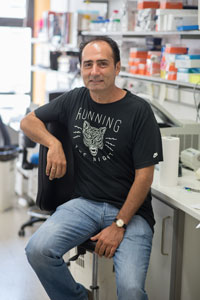All Science News
New scientific discovery by researchers at FORTH DNA damage triggers metabolic reprogramming, leading to aging
Inborn defects in DNA repair mechanisms are associated with cancer, aging but also complex metabolic and endocrine disorders. Integrity of the genome is critical for normal cellular function but the DNA is continually challenged by intrinsic and extrinsic genotoxic factors. To counteract DNA damage, cells have evolved DNA repair mechanisms ensuring that the genome remains functionally intact and is faithfully transmitted to progeny. Nucleotide excision repair (NER) is a major DNA repair mechanism that cells employ to remove a wide class of bulky, DNA-distorting lesions from the genome. The importance of NER defects in man is illustrated by rare syndromes that either show increased cancer predisposition or dramatic features of accelerated aging, including depletion of fat depots. However, with the exception of cancer and aging, the links between defects in NER and the rapid onset of developmental defects in humans are not well understood.
Research carried out at the Institute of Molecular Biology and Biotechnology-FORTH, published today in Nature Communications, provides evidence that persistent DNA damage triggers an exosome-based, metabolic reprogramming that leads to chronic inflammation and tissue pathology in DNA repair-deficient progeroid syndromes and likely also during aging. Using mice with an engineered DNA repair defect in tissue-infiltrating macrophages (cell type-specific ablation of a NER factor), the scientists revealed a fundamental mechanism by which irreparable DNA lesions in circulating macrophages secrete exosomes that trigger a metabolic switch leading to chronic inflammation.
Specifically, persistent DNA damage accumulation in tissue-infiltrating macrophages triggers robust cytoplasmic changes, autophagy and exosome biogenesis leading to the secretion of extracellular vesicles in vivo and ex vivo. The researchers discovered that the exosome cargo is taken up by recipient cells leading to enhanced cellular glucose uptake and to higher cellular oxygen consumption rate in mice. In turn, the IMBB researchers discovered that high glucose levels in recipient cells triggers pro-inflammatory stimuli. This, in turn, establishes chronic inflammation and tissue pathology in mice with important ramifications for DNA repair-deficient, progeroid syndromes and aging. The findings provide a novel mechanism to explain how DNA damage is causally linked to metabolic abnormalities and inflammation in man.
For more information, please contact: George A. Garinis, Professor, Dept. of Biology, University of Crete and affiliated group leader at IMBB-FORTH. http://www.garinislab.gr (Tel.: +30 2810391246; email: garinis@imbb.forth.gr)

Professor George A. Garinis










